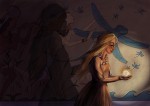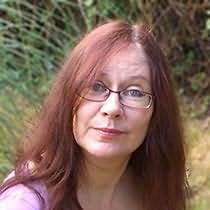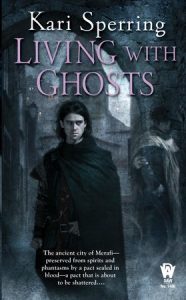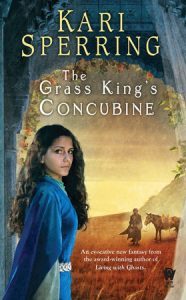Unreal: Kari Sperring writes for Nobody Knew She Was There


Unreal
Kari Sperring
I’m not sure about being noticeable: I never have been. It’s not comfortable, being looked at by people you don’t know, and being looked at by people you do know can be highly disorienting. Which is perhaps a long-winded way of saying that when it comes down to it, I quite like being obscure. It lets me get on with things, get on with my everyday life. It lets me feel I have room to breathe. And a lot of the time, it makes me feel less unsafe, because being visible, being noticed, is a hazard and risk and a danger, and I am not good with any of that triad.
I can dimly remember, as a child, daydreaming of being a famous ballet dancer, or perhaps a famous actor. But my conception of both of these were less about being seen and more about being like favourite characters in stories. Posy and Pauline Fossil (in Noel Streatfeild’s Ballet Shoes) leave the stage of the novel at the point their fame begins. I didn’t like Streatfeild’s later book Gemma, which dealt more with the actuality of fame. What I was drawn to in Posy and Pauline was their talent, their competence. And to me, at 6 and 7 and 8, being ‘famous’ meant being known for being good at what you do. I didn’t want Gemma’s life, with all the unwanted attention, the restrictions, the distance from normality.
I still don’t. It’s often said that there is a curious contradiction at the heart of the modern writing world. Writing is essentially a solitary pastime. To write consistently and well, you need blocks of quiet time in which to think, to plan, and to get the words down. But once a book is published, these days, writers are expected to put themselves out there in public and publicise their work. We are asked to make ourselves noticeable, and more than noticeable. We are asked to be loud and pushy and determined, all things at which I am bad.

They are also all things which I have always been told not to do, not to be. I don’t know how much of this is generational, how much is gendered, how much is class-based, but I know I am not alone in this feeling that there is something inherently wrong in drawing attention to myself or to my achievements. My culture, my society, my upbringing all taught me not to show off. And here I am, years beyond childhood, hating to take any of the steps that might bring my books more attention. Here I am, caught in the contradiction, happy to be unnoticed because it makes me feel safe, but required to become noticeable in order to further my writing career.
As a culture, we are far more forgiving of men drawing attention to themselves than women. White men in particular stand at the top of the social pyramid, encouraged to succeed, and supported to self-promote. We internalise these social hierarchies from an early age and act according to them. I hear my inner voice judging other writers sometimes. I roll my eyes at some of the men talking up their books day after day, but mostly I just accept it as background noise. But the women… I have actively to fight down the impulse that judges, that sees pushiness and intrusiveness, because I was educated to believe that women should be self-effacing. As women, we may feel obliged always to give way to others – male others first, of course, but also other women, because good girls don’t push.
And then, there’s another contradiction. Writing is a creative activity, and, like all creative work, it is hard to place an objective value on it. We make aesthetic judgements: this is beautiful, this is ugly; this is interesting, this is dull; this is Art, this is pulp. But they are not hard and fast: they vary from person to person, era to era, culture to culture. Creativity cannot be weighed and measured and doled out in tidy portions. Yet we live in a capitalist culture that does little but weigh and measure, and judges everything and everyone in terms of how much money can be earned. A work of fiction is appraised not on its content, on how readers experience it, on what it has to say about life and imagination, society and emotion and modernity and psychology, but on its marketability. How many copies does it sell? Does it contain tropes X and Y and Z which were in that other book which was a big seller, or is it about Q, which as a subject matter didn’t attract a lot of sales? Could it be a bestseller? An environment which values financial gain over every else, in which books are sales units, tends to prefer things which seem ‘safe’, things which are familiar, things which are like those things that already sell – and that tends to be books by white people, usually male, about a specific range of subjects, set in a specific subset of places. Some writers are comfortable with this: they value themselves and their books in these financial terms. And that’s fine. But many of us are not. Many of us struggle to make that direct a link between the value of our work in our own terms – did I achieve what I set out to in this book? What did I do well? What could I have done better? Did I convey my story, my theme, my meaning well enough – and the value placed on it by the market.

I am not a commercial writer. I’m just not wired that way, it seems. I write rather slowly, for one thing. For another, my style tends to the literary, which is of debateable value in fantasy. My plots tend to the odd. I know what’s going on in my characters heads, but I don’t always lay it out as clearly as I might. And I do not like either sentiment or consolatory endings. I am by training a historian of the early middle ages, and, well, life is not always – or indeed often – like that. (Though sometimes extremely odd things do happen in the real world. For instance, the fiancée of Llywelyn ap Gruffudd of Gwynedd really was captured by pirates on her way to their marriage.) I write, I’ve been told, difficult books. On my good days, I think they’re also okay books, but I find it hard to say – to write here in black and white – even that much about them. But I don’t know how to sell them, because, well, what do I say? They have ghosts, sometimes, and a lot of politics, and shape-shifters, and creatures from an underworld. They have printing presses and plague, a kind of elemental magic, swordfights and journeys into another realm. They have a lot about water: as a friend once observed, I am obsessed with water and how it shapes our worlds. They are the sort of books I write: it’s possible that they could only be written by me.
I write both fiction and non-fiction, and both are creative in different ways. Both are, I suppose, a kind of contribution to our ongoing cultural conversations. I can talk quite sensibly about my non-fiction, most of the time. I have a sense of myself as a competent historian: I know I know my material. With fiction, it’s harder. My worlds about which I write are unreal: they are endlessly mutable, veiled in layers of questions and possibilities that expand far beyond the many questions and possibilities of history. I am always searching, in my fictive worlds, for today’s revelations, today’s changes, but I know that on another day, these may be something completely different. The ground on which they stand is unreal.
Which spirals back, for me, to where I started. Because to me, being noticed is about being real. And a lot of the time, well, I just don’t know. If a tree falls in a forest, and nobody sees, was it ever really there? And, aside from those words I put down and send out to be seen, am I real, from moment to moment? There is always a now, but I can’t be truly sure of anything outside that: the past is mutable, interpretable in multiple ways. The future is never here. Before I was published as a writer of fiction, I was never sure if I really was a writer: real writers were in print. Now… My books are real, certainly, their mutable worlds frozen into particular form. But for myself, I remain unsure. Real writers sell, says the voice of the market. Real writers put themselves out there. Real writers are noticed, noticeable, seen. Real writers write a lot, are not slow or uncomfortable with attention.
My writing is real. But for myself…. I think I may still be on some level unreal.
Kari Sperring grew up dreaming of joining the musketeers and saving France, only to discover that the company had been disbanded in 1776 and anyway never admitted women. Disappointed, instead she studied Anglo-Saxon, Norse and Celtic at Cambridge University. As K.L/Kari Maund she has written and published five books and many articles on Celtic and Viking history and co-authored a book on the history and real people behind her favourite novel, The Three Musketeers (with Phil Nanson). Alongside this, she went on writing fiction and began selling short fiction in 2007. She has published two novels, Living with Ghosts and The Grass King’s Concubine.



